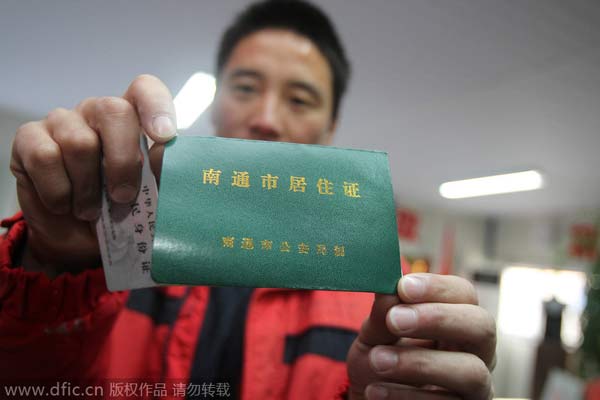China to abolish controversial temporary residence permit
Updated: 2015-02-15 17:02
(Xinhua)
|
|||||||||||
 |
|
A man displays his newly received residence permit in Nantong, Jiangsu province on December 19, 2013. [Photo/IC] |
BEIJING - China plans to abolish its controversial temporary residence permit and push forward reform of the household registration system, according to a public security reform plan released on Sunday.
Permanent residence permits will be adopted to replace the much-criticized temporary residence permit, according to the plan approved by central authorities.
Temporary residence permits have long been held by hundreds of millions of Chinese migrant workers, who have to apply for the permit before formally living and working in a new city.
Observers said the permit has led to instability and unsettlement and that the temporary residence registry system is no longer suitable for today's situation.
Many cities in China have already ended the temporary permit system, but Beijing currently still uses it.
In 2003, Sun Zhigang was stopped by police in the street in Guangzhou for a random check. He had no ID card and had not applied for the permit, so police considered him a beggar and sent him to an asylum, where he was beaten to death.
The tragedy triggered nationwide debate, as sending those without ID cards and residence permits to asylums against their will is unconstitutional and a violation of citizens' rights to personal liberty.
Permanent residence permit holders will enjoy many of the same privileges as local residents. They may receive social security, buy apartments and cars and receive the same public services as local people. In many Chinese cities, only locals or migrants with more than five years of paying local taxes in the city are allowed to buy apartments and cars.
According to the reform plan, the level of public services enjoyed by residents will depend on their duration of residence.
Public security departments should facilitate permanent residence registration and ID card applications when applicants are not in the cities where they applied for permanent residence, the plan said.
Public security reform was listed as a focus by central authorities last year as part of China's rule of law drive.
Related Stories
Residence permit reform to give migrants equal rights 2014-12-05 12:51
Beijing launches residence permit reform 2013-01-23 17:20
How does a person with an L or F visa apply for a residence permit? 2014-05-19 15:22
Today's Top News
2 deadly shootings within hours in Copenhagen
Slovakia to host peace conference on Ukraine in March
Chinese-built railway in Angola open to traffic
Ukraine ceasefire deal offers peace chance
Moldovan president designates businessman as PM
Greece fully committed to port, Tsipras tells Li
Chinese consumers in love with Western day of romance
China's subsidies 'comply' with WTO rules: Ministry of Commerce
Hot Topics
Lunar probe , China growth forecasts, Emission rules get tougher, China seen through 'colored lens', International board,
Editor's Picks

|

|

|

|

|

|





